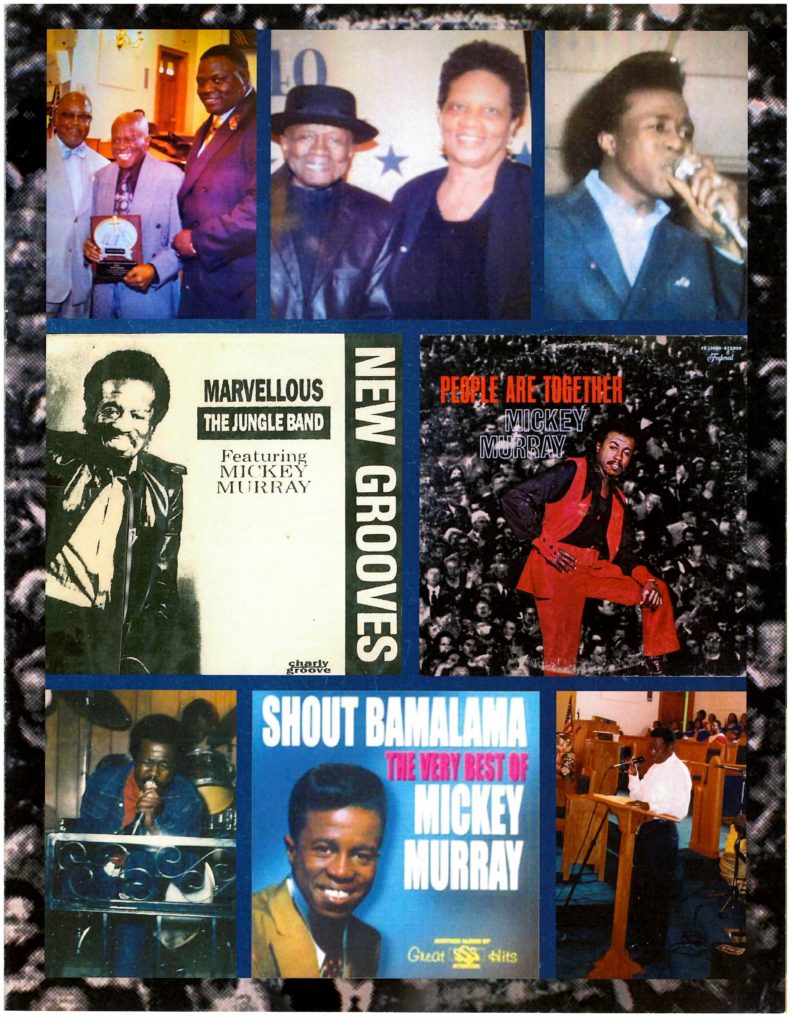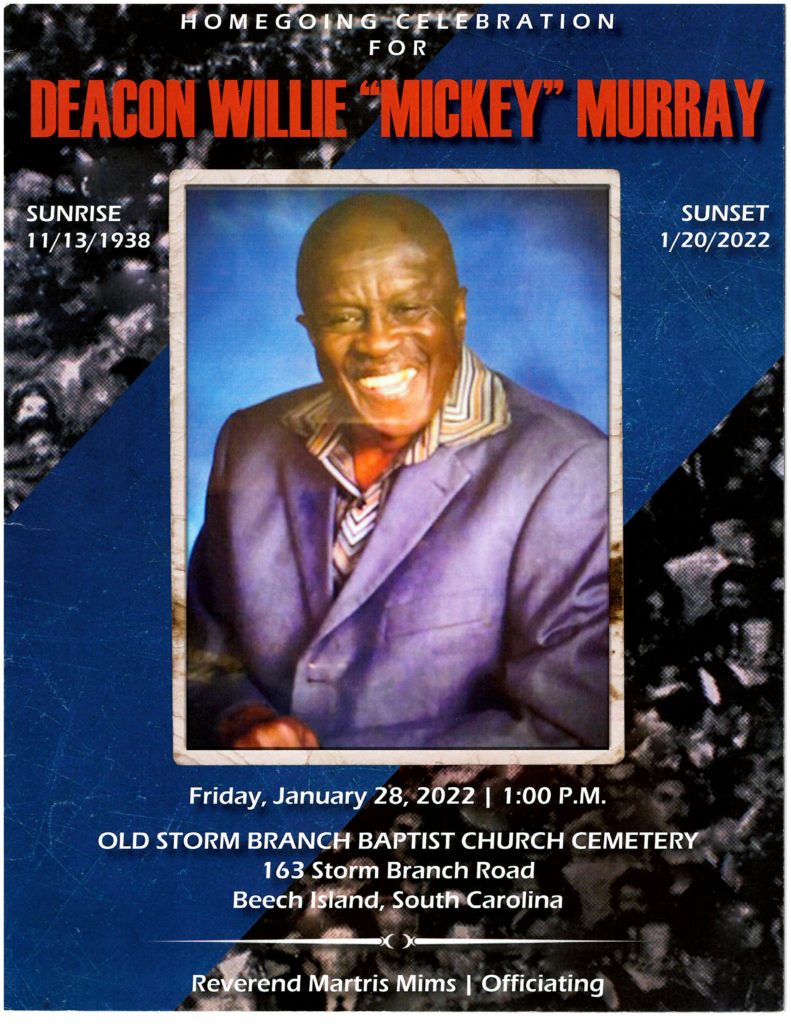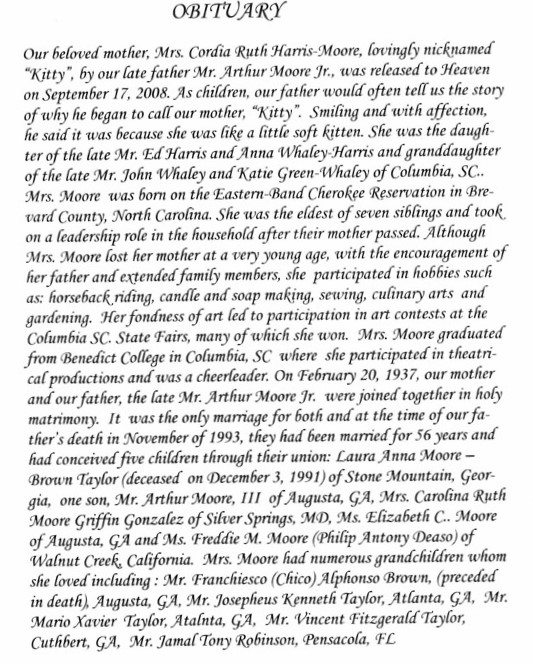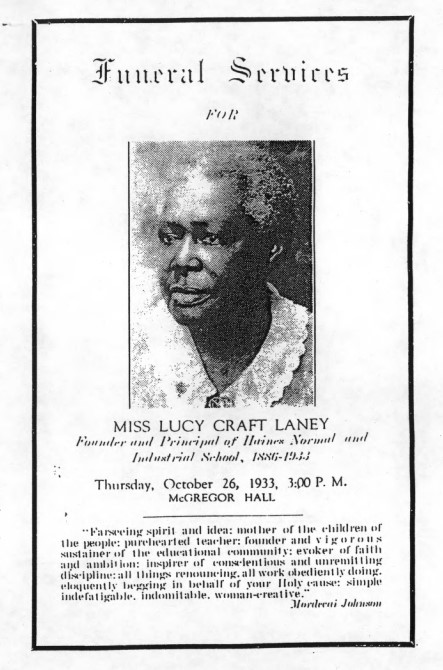
In 2005, the Augusta Public Library received an unexpected but significant donation from local genealogist and author, Gloria Ramsey Lucas. The donation comprised nearly 300 funeral programs of extended family and friends that her aunt Eula Mae Ramsey Johnson had collected over her lifetime. An avid genealogist and former president of the Augusta Genealogical Society, Ms. Lucas is known for her award-winning work, Slave Records of Edgefield County, an exhaustively researched index listing slaves and slaveholders in Edgefield County, South Carolina gleaned from probate, property, and tax records. The book is a boon to family history researchers with enslaved ancestors in South Carolina.
Understanding the challenges and brick walls many African Americans face when researching the lives of their ancestors, Gloria Lucas knew that funeral programs could provide valuable clues. While traditional genealogy records like birth, marriage, and death certificates give us critical information in terms of dates and locations, funeral programs paint a more personal picture of our deceased loved ones. We learn about a person’s relationships, community or religious ties, social circles they traveled in, churches they attended, as well as occupational information, and interests and hobbies. Sometimes the obituary found in a funeral program is the only biographical information that exists for a person, giving them an added significance.
Shown here are two images from the full-color program of Deacon Willie Murray, better known as Mickey Murray who grew up in North Augusta and went on to become one of the nation’s top soul singers in the 1960s. Mickey Murray’s recording of Otis Redding’s, Shout Bamalama in 1967, sold over one million copies and propelled him to stardom. While this program chronicles the life of a well known musician, the majority of the funeral programs in the library’s collection document the lives of lesser known folks who led equally remarkable lives. What comes to mind as one reads through the obituaries is how deeply personal they are, how they offer a window into the hopes and dreams of that individual, their many accomplishments over a lifetime, and how they are remembered by loved ones.
Family members searching for clues about Cordia Ruth Moore’s life would be delighted at the details given in her funeral program. Like most programs, we learn when and where she was born, who her parents are, who she married, the names of her children, and her many grandchildren. But, Cordia’s beautifully written obituary also tells us her many hobbies, among them, horseback riding, candle and soap making, and gardening. We are also given her religious affiliations, educational history, and membership in organizations. While knowing a loved ones birth, marriage, and death dates as well as locations of these events is important, it’s the personal details that reveal the richness of their lives, and connect them with our own.
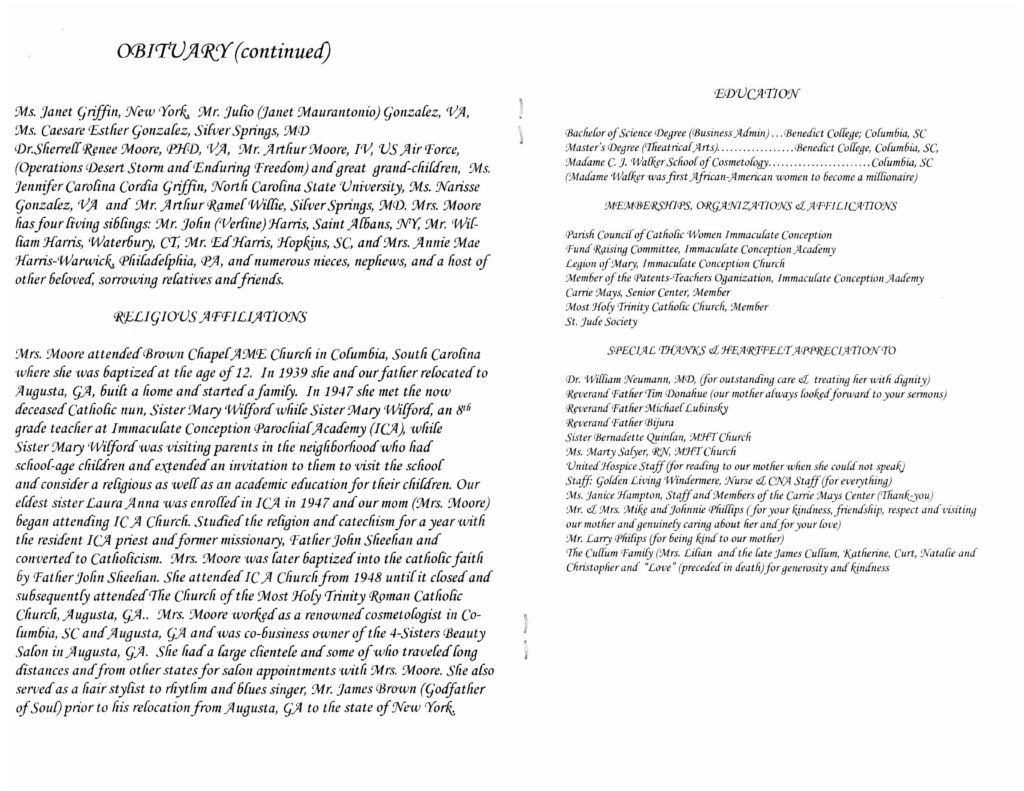
The two earliest programs in the library’s collection are of Lucy Craft Laney, founder and principle of Haines Normal and Industrial School, and the program of a woman who was born a slave and died at 113 years of age. Both programs contain valuable information about these two women. They also offer insight into the time period in which they were created. Examining several different funeral programs from a specific time period can reveal historical themes and trends, making them not only important for genealogical research, but a valuable primary source for historians as well. For example, Ms. Laney’s program lists other important figures in Augusta at the time of her death (1933) who were active in the political, educational, and religious arenas of Augusta’s African American community.
Unfortunately, funeral programs can be hard to find, tucked away and sometimes scattered in personal collections or at local churches and funeral homes. Over the last twenty years however, libraries throughout Georgia have been inspired by the Augusta Public Library Funeral Program Collection-believed to be the first of its kind- to build their own collections. Tamika Strong at the Auburn Avenue Research Library has played an integral role in building their collection from the ground up. After reading an article written in 2009 by Dottie Demarest-former Local History Librarian of Augusta Public Library- in the Georgia Library Quarterly about the funeral program collection, Ms. Strong stated, “if Augusta can do it, so could Atlanta.” To date, Auburn Avenue has amassed over 3,000 funeral programs. Other libraries in Georgia with growing collections are, Thomas County Public Library System and Moultree-Colquitt County Library System.
Each above funeral program collection, including the Augusta Public Library collection can be found in the Digital Library of Georgia (DLG). The DLG partners and provides funding to libraries throughout Georgia to have their archival collections digitized and made freely available to a wider audience. Follow the links below to learn more about these collections.
The Augusta Public Library depends on the local community to donate funeral programs to our collection. The programs are housed in the Georgia Heritage Room on the third floor of the headquarters library at 823 Telfair Street. We currently have around 4,000 of which about 3,600 have been digitized. Corey Rogers, Director of the Lucy Craft Laney Museum of Black History, and Diversity Scholar, Joyce G. D. Law have been instrumental in building the library’s collection and have our gratitude. Please consider donating. If you wish to keep your programs, Georgia Room staff will happily make copies and return the originals. To contact us, please call 706-826-1511 or email Tina Monaco at monacot@arcpls.org.

